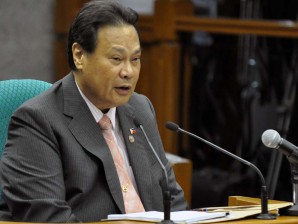Securing the documents showing the net worth of judges and justices is not going to be a walk in the park after all, notwithstanding the conviction of ousted Chief Justice Renato Corona on the very issue.
The Supreme Court has ruled that all requests for copies of the statements of assets, liabilities and net worth (SALN) of all judges and justices in the country will not be granted outright, but should have the approval of the members of the respective courts.
Saying the public’s right to information “is not absolute,” the high court set a rather stringent seven-point guideline for individuals asking for copies of SALNs of the magistrates and judges of the lower courts.
Right not absolute
“The court notes the valid concerns of the other magistrates regarding the possible illicit motives of some individuals in their requests of access to such personal information and their publication,” the tribunal said in a 22-page resolution.
“Like all constitutional guarantees, however, the right to information with its companion right of access to officials records, is not absolute,” it added.
“While providing guarantee for that right, the Constitution also provides that the people’s right to know is limited to ’matters of public concern’ and is further subject to such limitations as may be provided by law,” the high court said.
The rules for the release of the SALNs of the members of the bench were contained in the resolution issued by the high court on June 13, a copy of which was released to the media only on Wednesday.
The tribunal said the guidelines also covered requests for the copies of personal data sheets (PDS) and curriculum vitae (CV) of the magistrates and other judiciary officials.
Guidelines
In its resolution, the high court said individuals asking for copies of SALNs of justices should address their letters to the respective clerks of court of the Supreme Court, Sandiganbayan, Court of Tax Appeals and the Court of Appeals.
It said the clerks of court would ascertain if the requests “are not covered by the limitations and prohibitions” of Republic Act 6713, otherwise known as the Code of Conduct and Ethical Standards for Public Officials and Employees.
The clerk of court concerned will then refer the matter pertaining to a justice to the respective courts en banc for final determination, the Supreme Court said.
The high court said all requests must satisfy the following guidelines before they can be granted:
The requests should be submitted to the clerk of court of the Supreme Court and the appellate courts. In the case of trial court judges, the requests for SALN, PDS and CV should be filed with the Office of the Court Administrator;
The request should only cover the latest SALN, PDS and CV of the officials of the judiciary and “may only cover previous records if so specifically requested” and justified;
In the case of the Supreme Court, the Court of Appeals, the Court of Tax Appeals and the Sandiganbayan, all requests should be approved by the court en banc;
Each request must explain the specific purpose and “their individual interests sought to be served.”
The court said persons requesting for copies of SALNs must fill out a request form and “state the commitment that the request shall only be for the stated purpose.”
Beyond curiosity
If the requesting party is not a media practitioner, they must show that their interests were “beyond pure or mere curiosity.”
Journalists must submit proof of their media affiliation or similar accreditation. The requesting individual “must have no derogatory record of having misused any requested information previously furnished to them.”
In making public the SALN of judges and justices, the high court reminded government employees that they “must, at all times, be accountable to the people, serve them with utmost responsibility, integrity, loyalty and efficiency, act with patriotism and justice, and lead honest lives.”
The resolution was based on 21 separate letters made by various individuals asking for copies of the SALNS of justices of the Supreme Court, among them a letter dated July 30, 2009, of Rowena Paraan, the former research director of the Philippine Center for Investigative Journalism.
Transparency
During his impeachment trial, Corona signed an unconditional waiver allowing the Anti-Money Laundering Council, the Bureau of Internal Revenue and the Securities and Exchange Commission to look into his bank accounts and business interest.
Corona’s act has been hailed as a good start to show transparency in the government with some members of Congress and Senator Francis Escudero signing similar waivers and challenging other government officials to do the same.
Corona, however, has been removed from office after he admitted that he did not include in his SALN his $2.4-million deposit in four bank accounts and P80-million deposit in three bank accounts.
Originally posted at 09:13 pm | Wednesday, June 20, 2012
